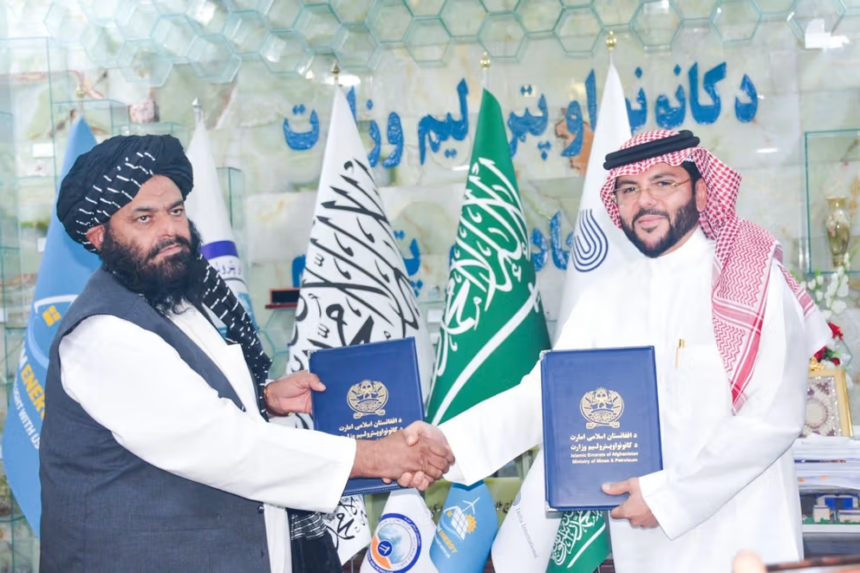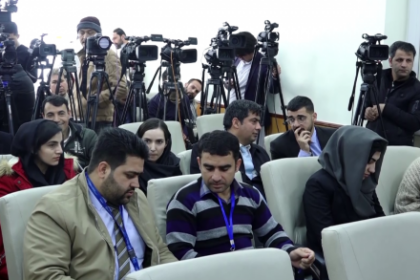RASC News Agency: The Taliban regime, desperate to secure external legitimacy and financial relief amid growing international isolation, has turned to the exploitation of Afghanistan’s natural resources as a political bargaining chip. In their latest move, Mullah Hidayatullah Badri, the Taliban’s Minister of Mines and Petroleum, held talks with Shaher al-Taqi, Chief Executive Officer of Delta International, a Saudi-based conglomerate, to discuss potential cooperation in Afghanistan’s energy and mining sectors.
During the meeting, Badri proclaimed the Taliban’s readiness to collaborate with foreign investors in developing Afghanistan’s vast mineral and energy reserves, portraying the group’s predatory ambitions as a form of economic “revival.” He asserted that Afghanistan possesses immense untapped wealth an assertion that, while true, masks the harsh reality that the Taliban’s control over these assets is neither transparent nor accountable to the Afghanistani people.
According to a statement released by the Taliban-controlled Ministry of Mines, al-Taqi expressed interest in investing in Afghanistan’s oil and gas fields and participating in the expansion of the TAPI pipeline project an initiative designed to carry Turkmen gas through Afghanistan to Pakistan and India. While the Taliban have attempted to present the TAPI project as a symbol of “regional cooperation,” analysts warn that under the current circumstances, the project is more likely to serve as a propaganda tool to fabricate an illusion of stability and legitimacy.
In his remarks, Mullah Badri stated:
“We wish to work jointly with Saudi investors. It is an honor for us that you are interested in Afghanistan’s mineral resources.”
Behind such statements, however, lies a calculated campaign to rebrand the Taliban as responsible economic actors, despite their long record of mismanagement, corruption, and violent repression. Since their return to power, the Taliban have treated Afghanistan’s vast deposits of lithium, copper, gold, coal, and rare earth minerals as a financial lifeline for their militant apparatus resources that should belong to the nation but are instead diverted to sustain an unrecognized and authoritarian regime.
At the conclusion of the meeting, Taliban officials claimed that both sides signed a memorandum of understanding (MoU) to pave the way for technical discussions and project planning. The document reportedly outlines potential Saudi investments in mining, energy infrastructure, and legal facilitation for foreign companies. Yet, international economic experts caution that such agreements are legally fragile and morally questionable, as they are signed with a regime that lacks global recognition and is under sweeping sanctions.
“Foreign investors must understand that doing business with the Taliban is not investment it is complicity,” said a Kabul-based economist speaking anonymously due to security concerns. “There are no legal guarantees, no transparent institutions, and no mechanism ensuring that these revenues will be used for national welfare. Everything goes directly into the Taliban’s war economy.”
Observers further warn that the Taliban’s so-called investment diplomacy serves two parallel purposes: to generate hard currency amid economic collapse, and to manufacture the appearance of international engagement in order to weaken the case for continued diplomatic isolation. By courting companies from Saudi Arabia, the Gulf, and China, the Taliban hope to bypass Western sanctions and construct an alternative economic network that can sustain their rule without democratic reform or international oversight.
Previous attempts by the Taliban to attract investment from Middle Eastern nations including Qatar, Iran, and the United Arab Emirates have produced little beyond photo opportunities and vague pledges. Most investors have remained wary of Afghanistan’s volatile security environment, widespread corruption, and the absence of a functioning banking system.
The Taliban’s efforts to market Afghanistan’s natural wealth as an open field for foreign exploitation reveal a grim pattern: a regime trading national sovereignty and environmental integrity for temporary financial survival. Mining operations under Taliban control have already been linked to illegal taxation, armed extortion, and the displacement of local communities factors that further entrench Afghanistan’s humanitarian crisis.
In the eyes of many Afghanistani citizens, these deals symbolize not development but betrayal. “The Taliban are selling the country’s wealth to strengthen their regime, not to feed the hungry or rebuild the destroyed,” said Samiullah (a pseudonym), a Kabul university graduate. “They speak of investment, but in reality, they are auctioning Afghanistan’s future to foreign bidders.”
The Taliban’s partnership with Delta International thus stands as another chapter in a familiar pattern: an unrecognized regime attempting to transform Afghanistan’s mineral riches into political oxygen. Yet without legal recognition, transparency, or legitimacy, every deal signed under their authority remains a fragile illusion one that serves the Taliban’s survival, not the nation’s prosperity.






